What if something that is supposed to give you comfort turns out to be a cause of concern? While having faith in religion guides you, brings you peace, and serves as a moral compass on how to live your life, for some people, it's driven by fear and guilt.
In obsessive-compulsive disorders, a lesser-known but equally distressing condition is called Religious OCD or Scrupulosity. What is Religious OCD? Also known as Scrupulosity, it is a form of obsessive-compulsive disorder (OCD) characterized by excessive and distressing obsessions and compulsions related to religious traditions. Individuals with this condition often struggle with intrusive and irrational thoughts centered around their faith or morality. Religious obsessive-compulsive disorder can be highly disruptive to a person's life and faith experience.
Let's look at the signs, symptoms, and available treatments for Religious OCD, illuminating a condition that affects many lives. We'll explore the complex web of religious thoughts and fears that leave people in distress and relentless mental loops.
What Is Religious OCD?
Religious OCD, often called Scrupulosity, is a specific subtype of obsessive-compulsive disorder (OCD) that revolves around excessive concerns and obsessions related to religion, morality, and ethics. People with Religious Obsessive Compulsive Disorder experience distressing and intrusive thoughts, often fixated on religious or moral themes.
These obsessions can range from fears of committing blasphemy, sinful acts, or moral wrongdoing. To alleviate their anxiety, individuals with Scrupulosity engage in compulsive behaviors, such as repetitive prayers, rituals, or seeking reassurance from religious authorities. Signs of religious OCD include excessive religious rituals and compulsive confession.
It's important to note that Religious OCD does not reflect an individual's true beliefs or character. Instead, it's a mental health disorder characterized by irrational and distressing thoughts and behaviors. Understanding what Religious OCD is explains the condition, which makes it easier to get support and appropriate treatment for those affected by this challenging disorder.
How To Know When To Seek Help
While it's normal to be devoted to one’s religious belief, follow the right pathway, and lead a morally good life, for some, this turns into an obsession about being perfect and life with constant fear of sin and moral failure. Some examples of behaviours that will help you recognize when you need help are-
- Intrusive religious thoughts that cause distress
- Excessive fear of sinning
- Repeating prayers constantly
- Constant need for reassurance from religious leaders or loved ones about moral standing
- Obsessive confession of perceived sins, even in the smallest mistakes
- Hyper-focus on morality, often leading to extreme guilt or shame.
- Extreme fear of being sent to hell after death
- Ritualistic behaviors tied to religion, performed to reduce anxiety
- Difficulty distinguishing between genuine faith and compulsive behavior
- Disruption of daily life due to time-consuming religious rituals
- Always feeling spiritually impure or morally flawed, no matter how devout
Religious OCD Symptoms
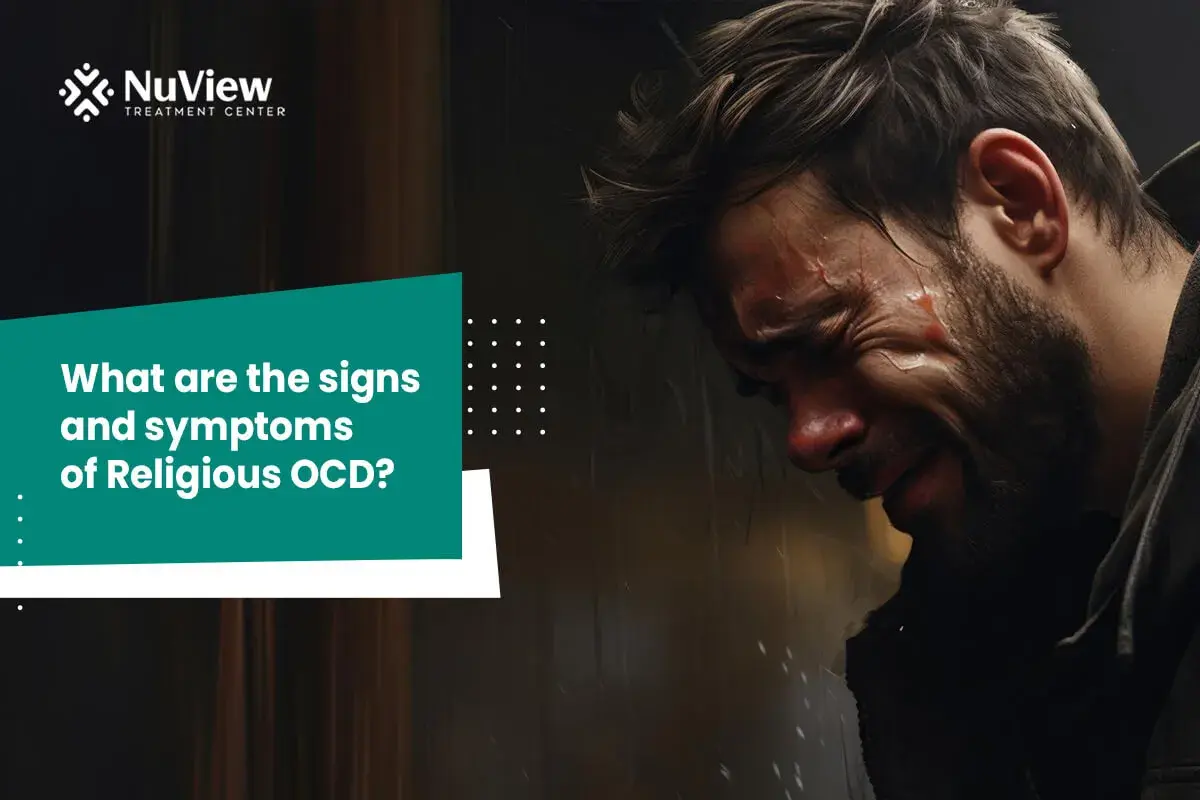
Religious OCD, or Scrupulosity, manifests through a variety of signs and symptoms, including:
Intrusive Religious Thoughts: Individuals experience distressing and unwanted religious or moral thoughts that are often extreme or irrational.
Excessive Guilt and Anxiety: A persistent sense of guilt and heightened anxiety related to perceived religious or moral transgressions.
Repetitive Confession: Frequent confession of perceived sins, often to religious authorities or figures, even for minor or doubtful actions.
Religious Rituals: Engaging in excessive religious services or practices, such as prayer, penance, or purification ceremonies, to alleviate anxiety.
Avoidance Behaviors: Avoiding situations, places, or people that trigger religious obsessions or moral doubts.
Excessive Self-Examination: Constantly questioning one's morality, ethics, and beliefs, leading to a continuous self-scrutiny.
Fear of Punishment: An intense fear of divine punishment, hell, or spiritual consequences for perceived wrongdoings.
Interference with Daily Life: Religious OCD can significantly interfere with daily functioning, relationships, and overall quality of life.
These are some of the most common religious OCD symptoms seen across cases.
Get Started With Nuview Treatment Center
Our dedicated professional staff is here to guide you or your loved one on the journey to lasting recovery, offering support every step of the way.
What Causes Religious OCD?
The actual cause of Religious OCD, also known as Scrupulosity, is unknown, but it's thought to be a combination of genetic, neurological, environmental, and psychological factors. Here's a breakdown of these contributing factors:
Genetic Predisposition:
Research suggests that genetics may play a role in developing OCD, including Scrupulosity. Individuals with a family history of OCD or related disorders may be more susceptible.
Neurological Factors:
Neuroimaging studies have indicated differences in brain structure and function in individuals with OCD. These differences may affect how the brain processes information and contribute to developing obsessive-compulsive symptoms, including religious obsessions.
Environmental Triggers:
Stressful life events, trauma, or exposure to some typical religious practice or teachings that emphasize strict moral codes can trigger the onset of Scrupulosity in susceptible individuals.
Psychological Factors:
Certain personality traits, such as perfectionism, anxiety sensitivity, and a heightened sense of responsibility, can increase the risk of developing Religious OCD. These traits may interact with environmental triggers to intensify obsessions and compulsions.
Religious Upbringing:
Individuals with a strong religious background or exposure to rigid religious doctrines may be more prone to Scrupulosity. These teachings can contribute to a heightened sense of moral responsibility and fear of religious consequences.
Childhood Experiences:
Traumatic or distressing experiences during childhood, particularly those related to religion or morality, may contribute to the development of Scrupulosity. When these factors combine, especially with rigid religious influences, they can contribute to the development of religious obsessive-compulsive disorder.
Get Started With Nuview Treatment Center
How Can Religious OCD Affect Your Life?
Religious OCD involves obsessive thoughts and compulsive behaviors related to religious or moral themes, and its effects can be profound. Here's how Scrupulosity can affect one's life:
-
Interference with Daily Functioning:
Religious OCD can consume a significant amount of time and mental energy. Obsessions like fears of committing religious sins or moral wrongdoings can lead to time-consuming compulsions, like repetitive prayers or rituals.
-
Strained Relationships:
Preoccupation with religious or moral concerns can cause strain in relationships, particularly with family members, friends, or members of the religious community. Loved ones may not fully understand the distress caused by Scrupulosity, leading to conflicts and isolation.
-
Impact on Religious Practices:
Paradoxically, individuals with Scrupulosity may become overly focused on religious rituals and practices. They might feel compelled to engage in excessive religious activities to alleviate their anxiety.
-
Mental Health Challenges:
Scrupulosity often co-occurs with other mental health conditions, such as depression and generalized anxiety disorder. The constant worry and distress associated with this OCD can exacerbate these comorbid conditions.
-
Diminished Quality of Life:
The relentless cycle of obsessions and compulsions in Scrupulosity can lead to a diminished quality of life. Individuals may avoid situations that trigger their obsessions, limiting their experiences and opportunities for personal growth.
-
Isolation:
Due to the distressing nature of their obsessions and rituals, individuals with Scrupulosity may become socially isolated. They might withdraw from social activities or religious gatherings to avoid anxiety-provoking situations.
-
Impaired Decision-Making:
Scrupulosity can cloud an individual's ability to make clear, rational decisions. They may choose based on irrational fears of moral consequences rather than logical reasoning.
-
Negative Self-Image:
Individuals with Scrupulosity often view themselves as morally flawed or evil. This negative self-perception can erode self-esteem and self-worth over time.
-
Spiritual Crisis:
Scrupulosity can lead to a spiritual crisis, where individuals question their religious faith, beliefs, and relationship with a higher power. This internal turmoil can be deeply distressing.
Is Religious OCD Treatable?
Yes, Religious OCD, also known as Scrupulosity, is treatable, and individuals affected by this condition can find relief and lead fulfilling lives. OCD treatment typically involves a combination of therapeutic approaches and, in some cases, medication. Here's how Scrupulosity can be effectively treated:
Cognitive-Behavioral Therapy (CBT):
Cognitive Behavior Therapy is the first-line treatment for Scrupulosity. It involves working with a trained therapist to identify and challenge irrational beliefs and thought patterns related to religion, morality, or spirituality. Exposure and response prevention (ERP), a specific type of CBT, is often highly effective. ERP exposes individuals to situations that trigger their religious obsessions and helps them learn to resist performing compulsive behaviors.
Medication:
In some cases, medication may be prescribed to alleviate the symptoms of Scrupulosity, particularly when the condition co-occurs with other anxiety disorders or depression. Selective serotonin reuptake inhibitors (SSRIs), such as fluoxetine or sertraline, are commonly used medications that can help in treating OCD by reducing obsessive thoughts and compulsive behaviors.
Support Groups:

Joining support groups or therapy groups specifically focused on OCD or Scrupulosity can provide individuals with a sense of community and understanding. Sharing experiences and coping strategies with others who have similar challenges can be highly beneficial.
Lifestyle and Stress Management:
Learning stress-reduction techniques and incorporating a healthy lifestyle, including regular exercise, a balanced diet, and sufficient sleep, can complement treatment efforts.
Family Education and Support:
Involving family members in the treatment process can enhance understanding and support for the individual with Scrupulosity. Educating loved ones about the condition helps create a more supportive environment.
Self-Help Strategies:
Individuals can also learn self-help strategies, such as mindfulness and relaxation techniques, to manage their symptoms. These methods can be used alongside formal treatment.
What Are The Therapies Used To Treat Religious OCD?
Therapy plays a central role in treating Religious OCD, also known as Scrupulosity. Two evidence-based therapeutic approaches that have proven effective in managing Scrupulosity are Cognitive-Behavioral Therapy (CBT) and Exposure and Response Prevention (ERP).
CBT for Religious OCD
Cognitive-behavioral therapy (CBT) effectively treats Religious OCD (Scrupulosity). It helps individuals challenge irrational beliefs, promoting healthier thinking and behavior. Key components include:
Cognitive Restructuring: Identifying and modifying distorted religious thoughts.
Exposure and Response Prevention (ERP): Gradual exposure to religious triggers without engaging in compulsions.
Behavioral Experiments: Testing the validity of religious fears.
Mindfulness and Acceptance: Staying in the present moment and accepting uncertainty.
Relapse Prevention: Equipping individuals with long-term coping skills.
ERP for Religious OCD
Exposure and Response Prevention (ERP), a form of CBT, effectively treats Scrupulosity. It exposes individuals to religious fears without compulsions. Key principles include:
Hierarchical Exposure: Gradual exposure to distressing religious triggers.
Response Prevention: Refraining from compulsive rituals during exposure.
Prolonged Exposure: Habituation to religious obsessions over time.
Homework Assignments: Practicing ERP techniques in daily life.
Does Religious OCD ever go away?
Religious OCD, or Scrupulosity, is a chronic condition, and while symptoms can improve with treatment, they may not entirely disappear. With the right Religious OCD Treatment, individuals can manage their symptoms effectively and enhance their quality of life. With therapy, medication, and support, many people can learn to cope with their obsessions and compulsions, allowing them to lead fulfilling lives.
Getting the Assistance You Need
Recognizing and addressing Religious OCD is crucial for individuals seeking relief from its impact. At NuView Treatment Center, we understand the challenges individuals and their loved ones face when dealing with Religious OCD.
Our center is committed to providing a range of tailored treatment options and comprehensive services to deliver holistic care and unwavering support to help individuals embark on recovery. If you or a loved one is seeking assistance managing Religious OCD, please contact us.
- What Is Religious OCD?
- How To Know When To Seek Help
- Religious OCD Symptoms
- What Are The Obsessions Related To Religious OCD?
- What Are The Compulsions Related To Religious OCD?
- What Causes Religious OCD?
- How Can Religious OCD Affect Your Life?
- Is Religious OCD Treatable?
- What Are The Therapies Used To Treat Religious OCD?
- Does Religious OCD ever go away?
- Getting the Assistance You Need
- What Is Religious OCD?
- How To Know When To Seek Help
- Religious OCD Symptoms
- What Are The Obsessions Related To Religious OCD?
- What Are The Compulsions Related To Religious OCD?
- What Causes Religious OCD?
- How Can Religious OCD Affect Your Life?
- Is Religious OCD Treatable?
- What Are The Therapies Used To Treat Religious OCD?
- Does Religious OCD ever go away?
- Getting the Assistance You Need
Get Help Today!
- Buchhulz, J. L., Abramowitz, J. S., Riemann, B. C., Reuman, L., Blakey, S. M., Leonard, R. C., & Thompson, K. A. (2019). Scrupulosity, Religious Affiliation and Symptom Presentation in Obsessive Compulsive Disorder.Behavioural and cognitive psychotherapy, 47(4), 478–492. https://doi.org/10.1017/S1352465818000711
- Besharat, M. A., & Kamali, Z. S. (2016). Predicting obsessions and compulsions according to superego and ego characteristics: A comparison between scrupulosity and non-religious obsessive-compulsive symptoms.Asian journal of psychiatry, 19, 73–78. https://doi.org/10.1016/j.ajp.2016.01.003
- Wenthur, C. J., Bennett, M. R., & Lindsley, C. W. (2013). Classics in Chemical Neuroscience: Fluoxetine (Prozac).ACS Chemical Neuroscience, 5(1), 14–23. https://doi.org/10.1021/cn400186j
- Regier, D. A., Kuhl, E. A., & Kupfer, D. J. (2013). The DSM-5: Classification and criteria changes.World psychiatry : official journal of the World Psychiatric Association (WPA), 12(2), 92–98. https://doi.org/10.1002/wps.20050
Everyone is Welcome Here and We All Have Your Back
Your healing journey deserves a personalized approach. At NuView, we integrate expertise in behavioral therapy, mental health, and substance use treatment to create a customized recovery plan tailored to your unique needs.
Connect with our Admissions Specialists today.
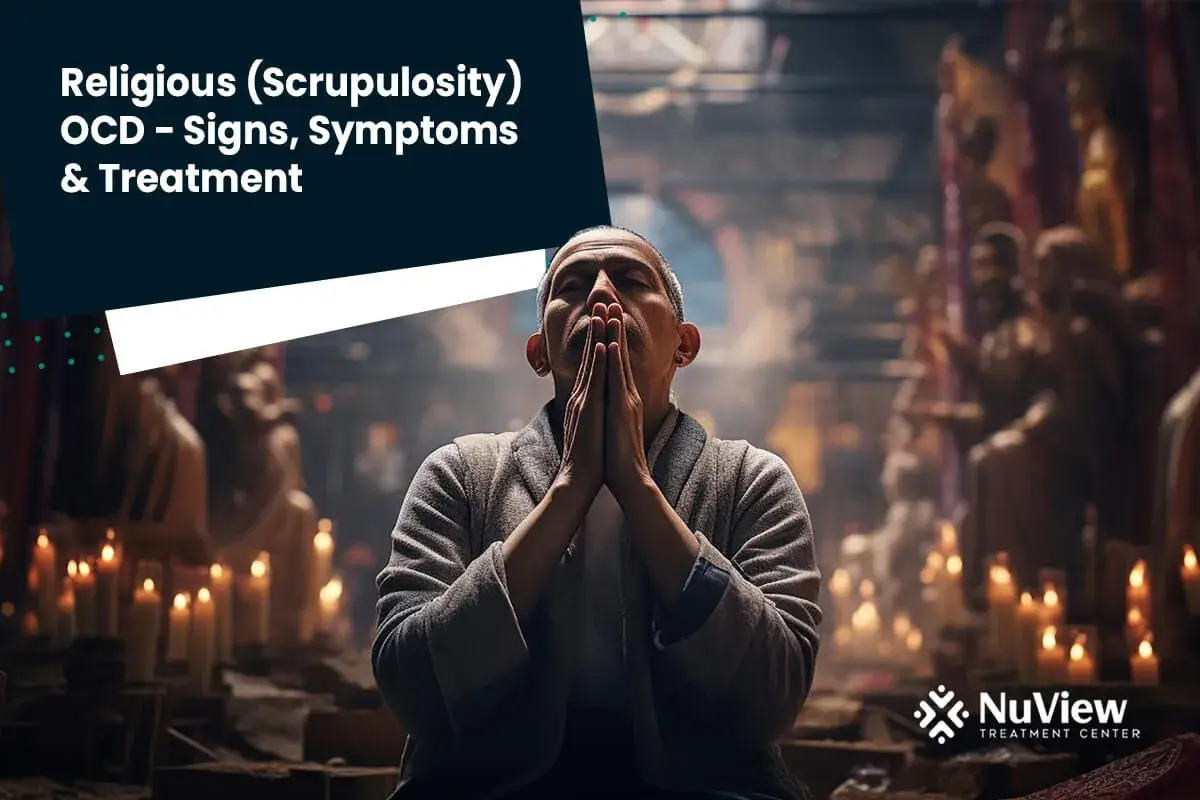
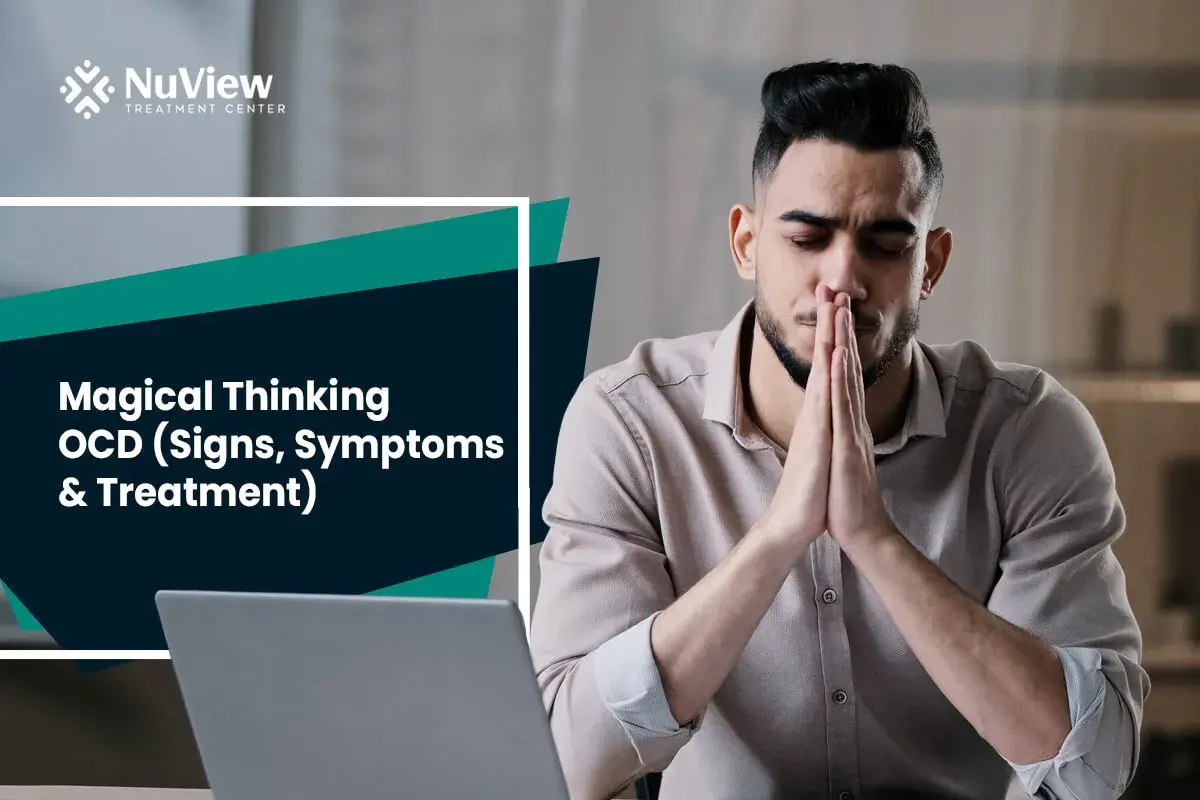
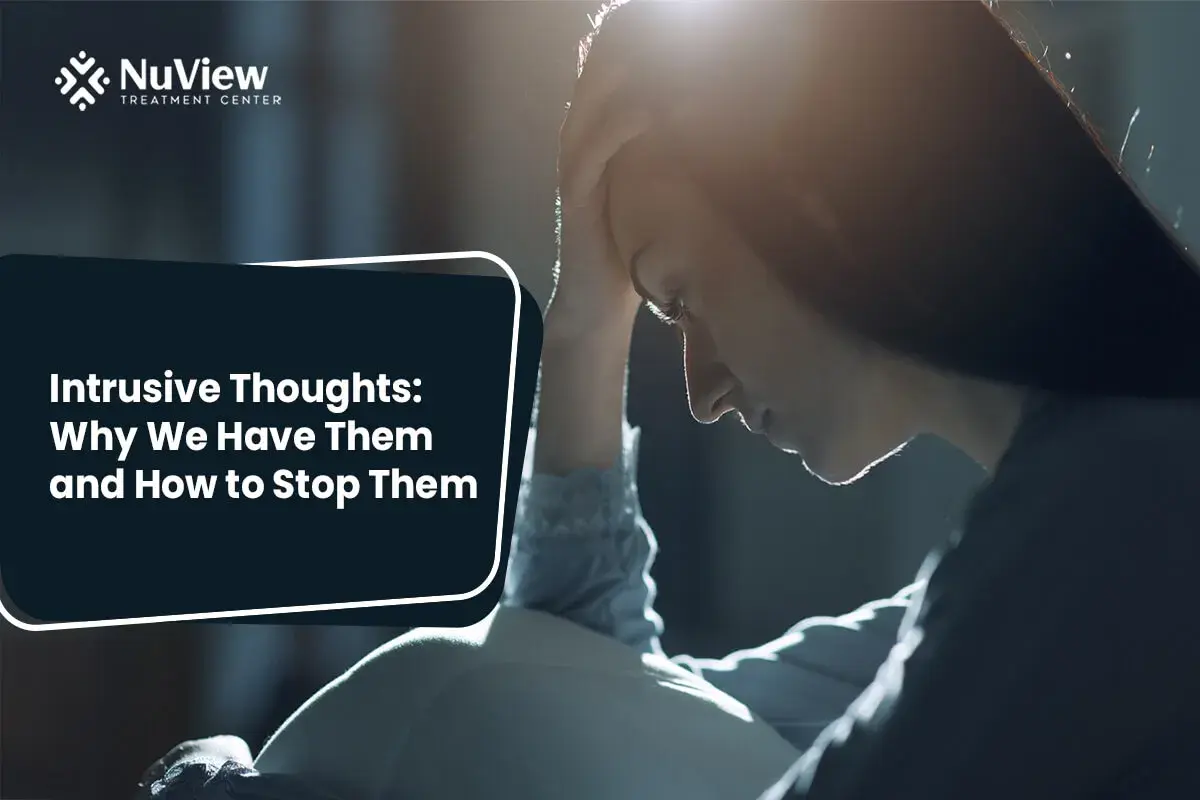
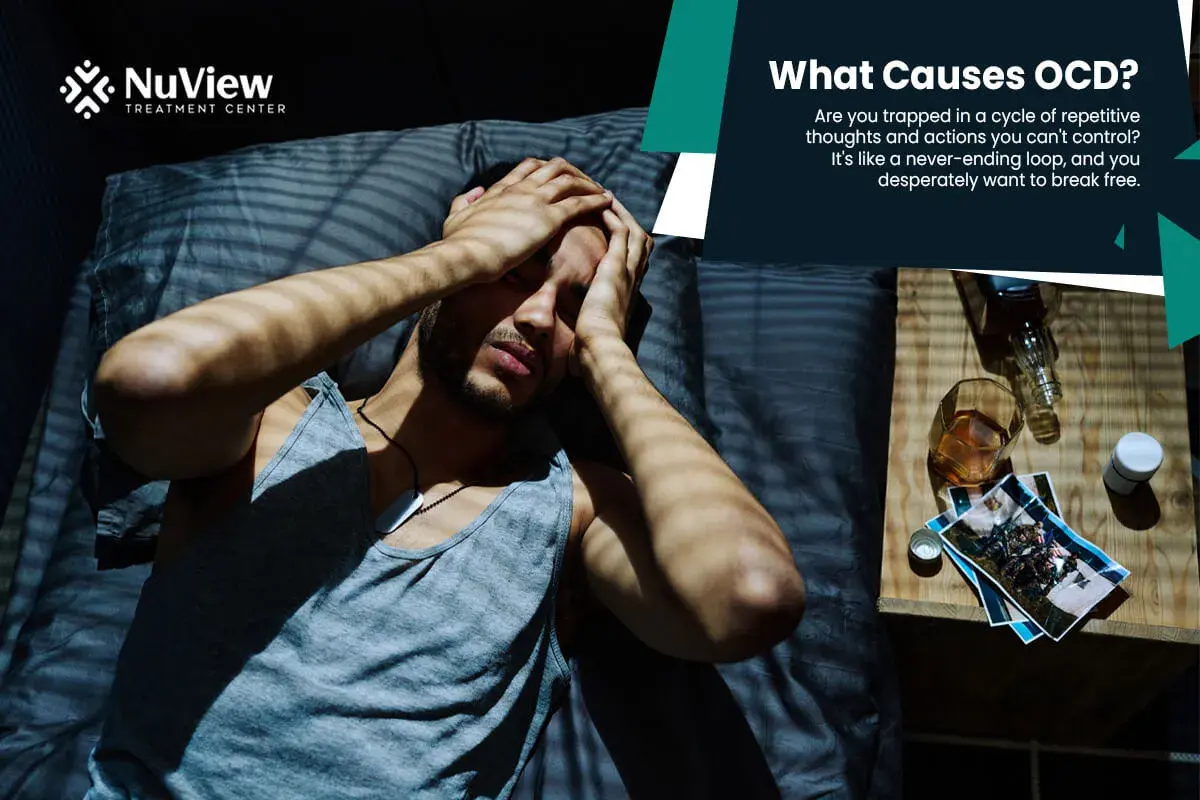



Written By
Dr. Ryan Peterson